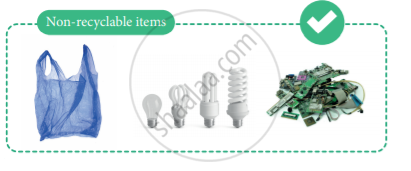Advertisements
Advertisements
Question
Suggest suitable mechanism(s) for waste management in fertilizer industries.
Solution
Suitable mechanisms for waste management in fertilizer industries:
Fertilizer industries generate solid waste, wastewater (contains organics, nitrates, alcohols, ammonia, phosphorous, heavy metals such as cadmium and suspended solids) and air pollutants (particulate matter, gaseous NH3, oxides of nitrogen, sulphur and carbon dioxide). So, the waste management mechanisms in fertilizer industries are:
- Wastewater should be treated before its discharge into the surrounding water.
- Solid waste should be dumped in a safe place by following safety measures.
- Air pollution should be controlled e.g., by fitting certain adsorption equipment in chimneys to absorb harmful pollutants before the smoke is released into the atmosphere.
APPEARS IN
RELATED QUESTIONS
Explain briefly how as a student, you can help in the reduction of waste generation.
What is garbage?
What can an individual do to reduce waste at home?
What is known as waste?
How many types of waste?
How is solid waste disposed of in ah incinerator?
What is waste disposal?
Study the image below and write down three items you have at home in each category of waste.

Non-recyclable: ______
The use of microorganism metabolism to remove pollutants such as oil spills in the water bodies is known as ____________.
How does recycling help reduce pollution?
Excessive exposure to ultraviolet radiation causes ______.
______ can return back to the soil and become food for plants.
______ waste can be turned into something new which is valuable.
The burning of solid waste in ______ is called incineration.
Garbage buried inside landfills remain here for a long time as they decompose very slowly and become _______.
The process by which waste materials are used to make new products is called recycling.
Analogy:
Biodegradable waste: Leaves, Garden wastes:: Non-biodegradable waste: ______.
Paheli gave the following ill effects of the practice of burning dried leaves and other plant parts
- Burning degrades the soil.
- Burning produces harmful gases/fumes.
- Precious raw materials to obtain manure at low cost are lost
- A lot of heat is generated unnecessarily
The correct reasons of why we should not burn leaves are
